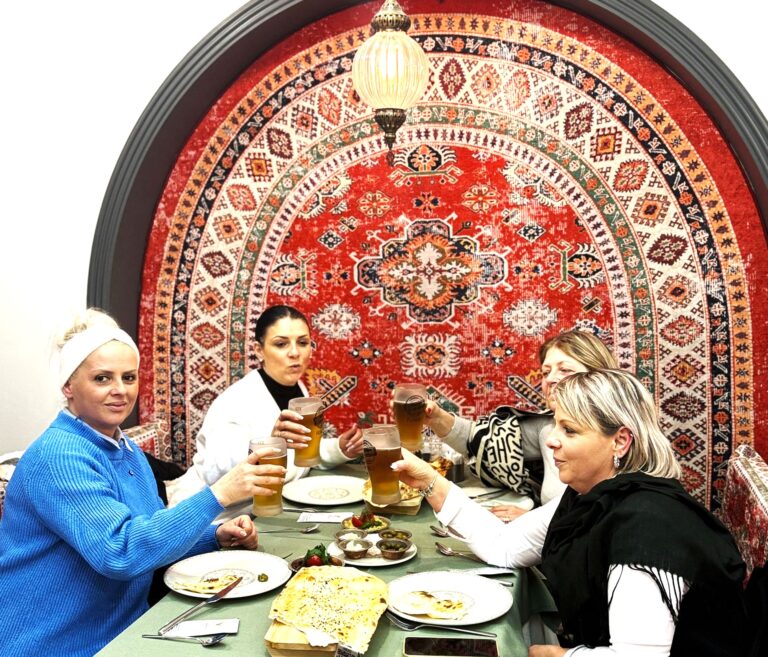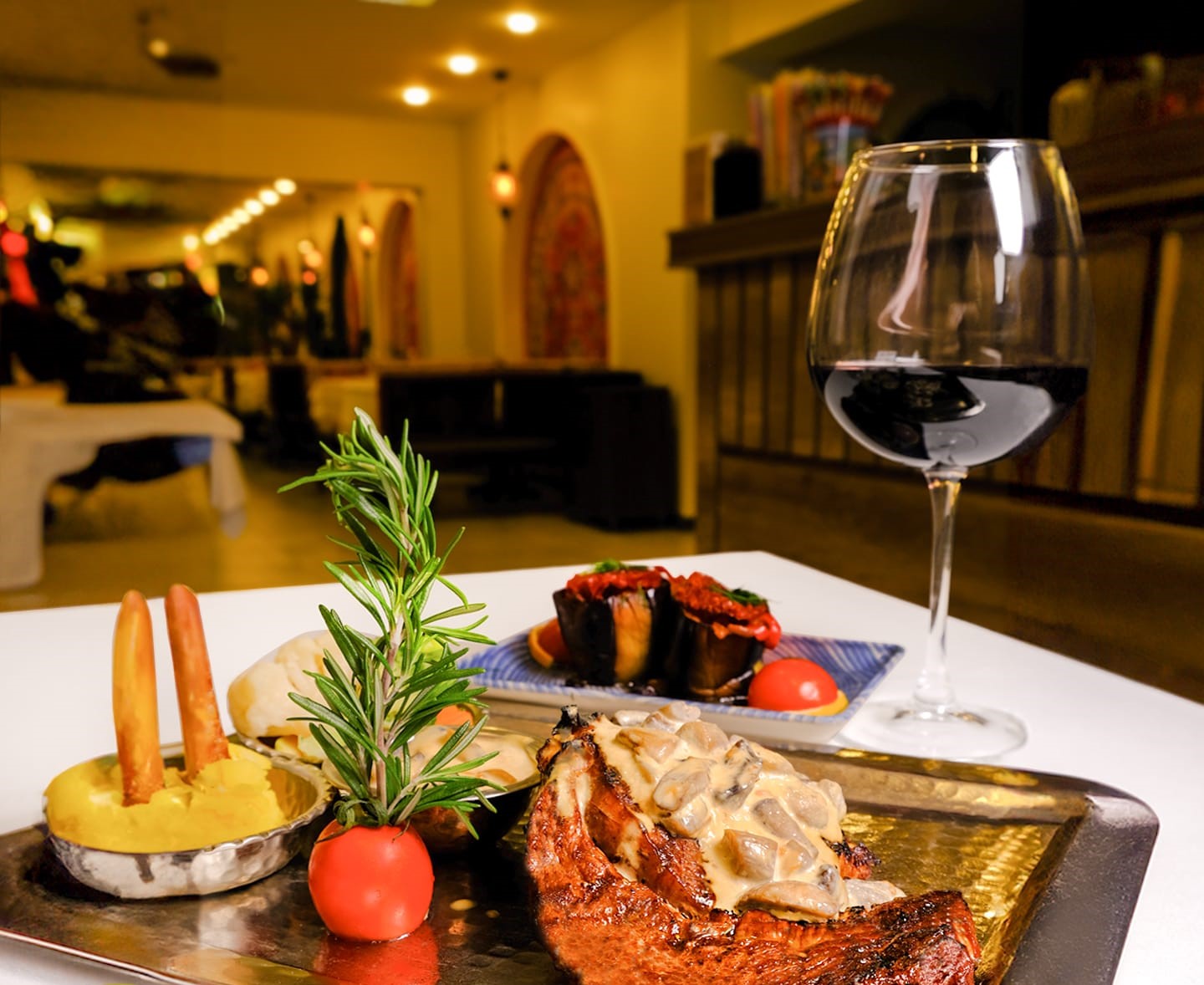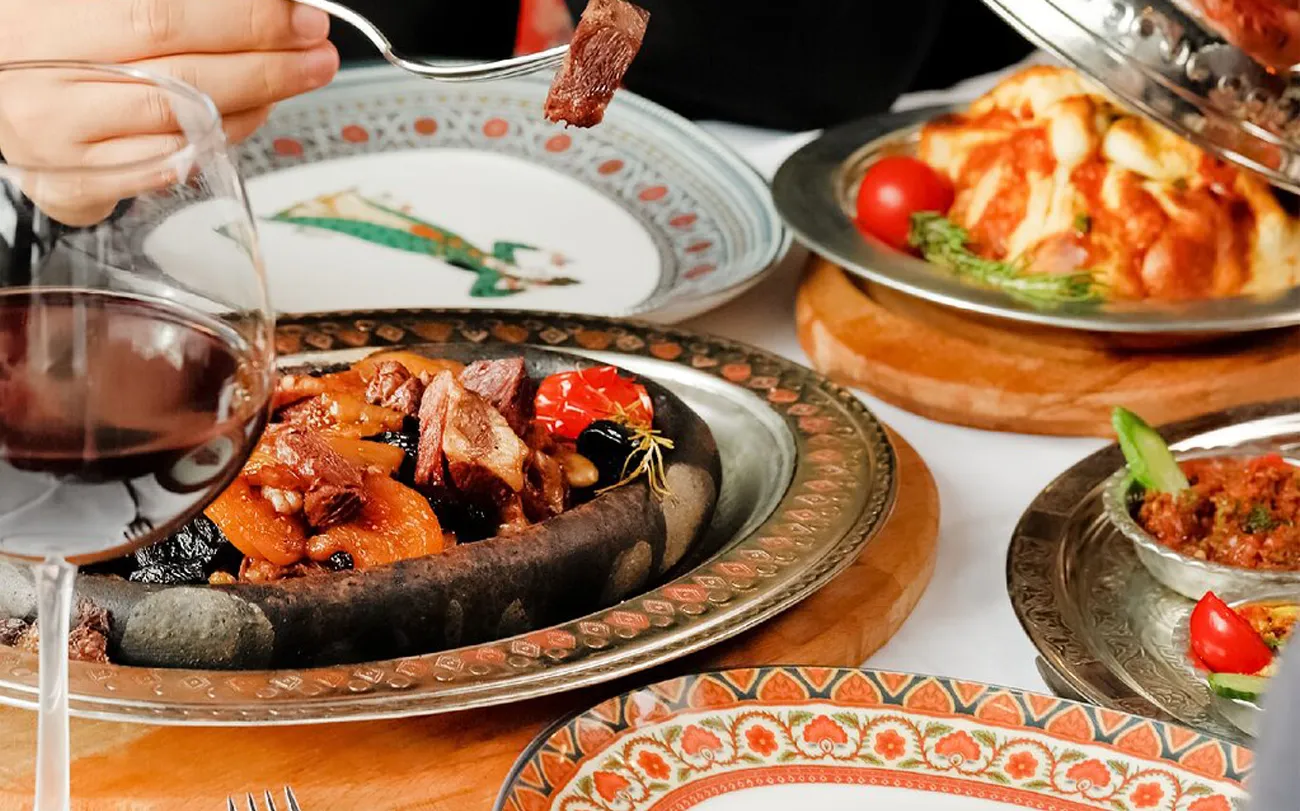Istanbul, a city straddling two continents and centuries of enthralling history, is widely recognized for its vibrant culinary culture. From the hidden gems dotting narrow alleyways to the grand establishments boasting panoramic views of the Bosphorus, this metropolis offers food lovers an array of gastronomic delights. One cannot possibly speak about the food scene without acknowledging the best restaurants in Istanbul that capture the city’s multicultural essence on a plate. Each neighborhood presents a new facet of Istanbul’s culinary identity, ensuring that every meal is a fresh adventure.
The heart of Istanbul beats in its bustling markets and iconic eateries, where the fragrance of roasted coffee mingles with the aroma of freshly baked simit and sizzling kebabs on every corner. Whether you are exploring the Spice Bazaar’s labyrinth of aromatic stalls or walking along the busy streets near Taksim Square, you will find yourself surrounded by tempting street food and countless restaurants vying for your attention. Yet, certain establishments stand out, not only for their food but also for the complete cultural experience they provide. Among these, the best restaurants in Istanbul are known for offering more than a meal—they gift diners memories woven with historical resonance and modern-day flair.
Food is deeply rooted in Turkish tradition, where ancient practices converge with contemporary culinary innovation. This is especially visible in a city like Istanbul, which has served as the capital of empires and a crossroads of trade for centuries. Different ethnicities and influences blended here, giving rise to diverse cooking methods and a wide selection of dishes that cater to the tastes of both locals and travelers. Today, Istanbul’s dining scene is an eclectic medley of elegant Ottoman-inspired recipes, robust Anatolian flavors, and fresh produce from local markets, culminating in a melting pot of gastronomic wonders. When visitors seek out the best restaurants in Istanbul, they are essentially embarking on a journey through the city’s rich tapestry of cultures and flavors.
One exceptional restaurant that has woven itself into Istanbul’s culinary story is Food Palace 1981. Its ethos is firmly grounded in authenticity, historical appreciation, and contemporary refinement—a combination that has steadily garnered it a well-deserved reputation among both locals and tourists. Located in a bustling yet charming part of the city, Food Palace 1981 welcomes visitors into an environment where the sensory delight of expertly crafted dishes meets a genuine ambiance that reflects Istanbul’s dual essence of tradition and modernity. Food is not merely food here; it is an immersive experience that resonates with Istanbul’s storied past and dynamic present.
In a city so vast, selecting a place to dine can be overwhelming for newcomers. Restaurant reviews, word of mouth, and personal preferences all play a role in decision-making. Still, it often comes down to which establishment best captures the soul of Istanbul through its menu and setting. The best restaurants in Istanbul share a commitment to fresh ingredients, time-honored recipes, and local heritage, ensuring that every bite tells a part of the city’s ongoing story. While travelers can be swept up by tourist traps, seasoned explorers know that choosing a restaurant with a solid reputation for quality, service, and atmosphere is key to a fulfilling gastronomic adventure.
In the sections that follow, we will delve deeper into Istanbul’s illustrious history and the many influences that have shaped its cuisine. We will also explore the essential factors that help you determine how to pick the right dining venue in Istanbul—factors that are especially relevant in a city where the variety can be both thrilling and daunting. You will discover the city’s must-try dishes, from street food staples to elaborate main courses, and learn the answers to burning questions like “What is Turkey’s signature food?” and “What is Turkey’s national dish?” We will also delve into what constitutes a traditional Turkish dinner and how to make the most of your culinary journey when visiting the iconic sites near Hagia Sophia and the Blue Mosque.
Toward the end, we will circle back to why Food Palace 1981stands among the best restaurants in Istanbul, showcasing how a dining experience here can be the perfect finale to a day of exploring Istanbul’s architectural, historical, and cultural wonders. Our exploration also highlights how traveler reviews and local insights play a pivotal role in understanding which establishments truly excel in capturing the spirit of Istanbul. By focusing on the thoughtful details—from impeccable service and menu variety to ambiance and heritage—Food Palace 1981 fulfills every criterion needed to be considered among the best restaurants in Istanbul. Whether you are here for a fleeting visit or planning a longer stay, making an informed dining choice will ensure your trip is a gastronomic delight as rich as Istanbul’s heritage.
 A Brief History of Istanbul
A Brief History of Istanbul
To fully appreciate the diverse culinary scene that characterizes the best restaurants in Istanbul, one must first understand the city’s historical tapestry. Istanbul, formerly known as Byzantium and later Constantinople, has been at the heart of many civilizations, including the Byzantine and Ottoman Empires. As you walk through the city’s winding streets, you can almost feel the echoes of the past in its architecture, from ancient Roman aqueducts to majestic mosques and palaces. Each empire left behind influences that molded the city’s identity, shaping its culture, traditions, and, of course, its cuisine.
Over two millennia, Istanbul evolved into a primary trade hub, linking Europe, Asia, and the Middle East. Merchants from faraway lands would bring spices, ingredients, and cooking methods that merged with local traditions. The city’s strategic position allowed for the interchange of ideas and resources, making it a center of culinary innovation long before the modern era. This is one reason why the best restaurants in Istanbul today offer menus that are both diverse and grounded in tradition, carrying centuries of gastronomic evolution on every plate.
During the Byzantine era, religious festivities influenced eating habits. Certain days were reserved for fasting, which encouraged a variety of vegetarian and fish dishes, while feast days featured abundant banquets of roasted meats, pies, and sweets. The cuisine from that period displayed a strong Mediterranean influence—olive oil-based stews, fresh herbs, and wheat products were prevalent. These early food practices subtly integrated into Istanbul’s culinary matrix, becoming part of the city’s legacy and setting the groundwork for future evolutions.
The city took on a grander gastronomic dimension under Ottoman rule. The imperial kitchens at Topkapi Palace were famed for their elaborate banquets. Chefs from different regions were summoned to create new recipes, incorporating everything from Persian pilafs to Balkan pastries. Spices like cinnamon, nutmeg, and saffron became more commonplace, and methods of slow-cooking meats or mixing fruits with savory dishes gained prominence. This period firmly established Istanbul’s reputation for culinary magnificence, resulting in a unique fusion of flavors that persists to this day. Some of the best restaurants in Istanbul still draw inspiration from age-old Ottoman recipes, bringing to life the richness of that era in refined modern settings.
Beyond the empires, the city’s diversity expanded with waves of migration. Communities from Greece, Armenia, and the Balkans contributed their own culinary heritages. Simple, hearty dishes rubbed shoulders with intricate desserts, broadening Istanbul’s gastronomic repertoire even further. The result is a tapestry of flavors so vast that it caters to nearly every palate. When you dine at the best restaurants in Istanbul, you are not just eating a meal—you are partaking in a centuries-long gastronomic conversation that transcends national boundaries and unites people through shared love of food.
As modern times rolled in, Istanbul continued to evolve while holding onto its core identity. The 20th century brought global cuisines into the city’s fold, resulting in a new generation of eateries that blend foreign elements with local tastes. Sushi bars coexist alongside traditional meyhanes, and fusion restaurants experiment with Thai and Italian influences. Yet, the best restaurants in Istanbul remain those that respect the city’s culinary lineage while intelligently incorporating new trends. This balancing act between heritage and innovation keeps the city’s dining scene perpetually dynamic.
In light of this storied background, it becomes clear why Istanbul’s food culture is so globally revered and why so many travelers go out of their way to seek out the best restaurants in Istanbul during their visit. It’s about participating in a centuries-long mosaic that has been carefully pieced together by countless hands. It’s also about celebrating the resilience of culinary traditions that have weathered empires, wars, and transformations, only to emerge richer and more layered than before.
From the vantage point of this historical perspective, modern travelers have much to gain by choosing their culinary experiences with care. Food is culture, and in a city as layered as Istanbul, every bite contains a piece of history. Venturing into an establishment that honors these roots, like Food Palace 1981, means partaking in a tradition as old as the city itself. By selecting the best restaurants in Istanbul, you ensure that your journey extends beyond sightseeing, forging a memorable gastronomic adventure that resonates deeply with the spirit of a city that has enchanted visitors for centuries.
Istanbul’s Food Culture
Few places on Earth can match the vibrancy and depth of Istanbul’s food culture. The city’s daily life revolves around eating, drinking, and socializing, with locals often gathering at meyhanes, cafés, or restaurants to share good times over delicious bites. This communal spirit of dining is one of the reasons that the best restaurants in Istanbul are not merely about feeding people but also about fostering a sense of togetherness and hospitality.
A typical day in Istanbul starts with a hearty Turkish breakfast. Olives, cheese, tomatoes, cucumbers, bread, honey, and clotted cream—commonly known as kaymak—are served along with perfectly brewed Turkish tea.
This ritual sets the tone for the rest of the day, emphasizing freshness and variety. It’s common to see locals lingering over breakfast, chatting animatedly while sipping multiple glasses of tea. This convivial morning tradition subtly underscores how essential food is to the Turkish way of life.
Street food also occupies a significant role in Istanbul’s gastronomic identity. Walk through Eminönü, and the aroma of grilled fish sandwiches—balık ekmek—wafts through the air. Near the iconic Taksim Square, you can find simit vendors selling rings of sesame-encrusted bread, a beloved on-the-go snack. Roasted chestnuts, Turkish-style bagels, and sweet corn stands punctuate almost every corner, providing quick and affordable nourishment to passersby. While these might not be categorized under the best restaurants in Istanbul, they are indispensable to the city’s culinary landscape, reflecting the daily rhythm and local flavors that define Istanbul life.
Turkish tea and coffee traditions are also integral to understanding the city’s food culture. Tea is consumed throughout the day and often serves as a symbol of hospitality—expect to be offered a cup upon entering someone’s home or even while browsing in a local shop. Turkish coffee, with its thick brew and distinct layer of coffee grounds at the bottom, is more than just a caffeine fix; it’s a conduit for social interaction. Friends discuss life over cups of coffee, and fortune-telling often follows, adding a fun, cultural twist to the experience. It’s no wonder that many of the best restaurants in Istanbul also pride themselves on their coffee and tea service, understanding how central these beverages are to local culinary customs.
Lunch and dinner in Istanbul range from simple to sumptuous. While some prefer traditional home-style cooking—like lentil soups, stuffed vegetables, or stews—others might opt for a sit-down experience at a meyhane, enjoying meze dishes (small plates) such as hummus, dolma, and fava. Fish restaurants along the Bosphorus showcase the city’s proximity to the sea, serving fresh catch grilled or baked. One can also explore modern interpretations of Turkish classics at restaurants that fuse Mediterranean, Asian, or European influences. These contemporary establishments are often recognized among the best restaurants in Istanbul, as they deftly blend old and new, paying homage to the city’s history while forging ahead with innovative recipes.
Desserts hold a special place in Turkish food culture. Baklava, made of layers of phyllo dough filled with pistachios or walnuts and soaked in syrup, is perhaps the most globally recognized sweet. Yet, there are many other indulgences to explore: kanafeh (a cheese-filled pastry soaked in sweet syrup), Turkish delight (lokum) in myriad flavors, and milk-based puddings like kazandibi (a caramelized milk pudding). People with a sweet tooth can find their bliss in traditional sweetshops that have existed for generations, proving that desserts, too, are woven into the cultural and historical fabric of Istanbul.
A special mention must be made of Istanbul’s meyhane culture. A meyhane is a traditional tavern-like establishment serving alcoholic beverages, particularly rakı, and a variety of meze. Rakı, sometimes referred to as “lion’s milk,” is a clear anise-flavored spirit that turns milky white when mixed with water. Meyhanes are places of conversation, music, and camaraderie, where people gather to eat, drink, and unwind. Many locals consider meyhanes just as vital as the best restaurants in Istanbul for understanding the authentic social experience of the city’s residents. The atmosphere is often lively, featuring Turkish music and sometimes even spontaneous singing from patrons, exemplifying the warmth and exuberance characteristic of Istanbul’s nightlife.
Throughout its long history, Istanbul’s food culture has been shaped by geographical, political, and social forces. Yet, the constant thread remains its deeply ingrained sense of hospitality and culinary excellence. Restaurants in this city often strive to go beyond the basics of providing a meal. Instead, they aim to create a welcoming environment where patrons can savor flavors, share stories, and form connections. This emphasis on communal sharing is precisely why it is crucial to research carefully when seeking out the best restaurants in Istanbul—not only for top-notch dishes but also for an ambiance that captures the essence of Turkish hospitality.
All these elements—breakfast rituals, street food, tea and coffee traditions, meyhanes, and decadent desserts—form the core of Istanbul’s culinary identity. They paint a picture of a city that has, for centuries, woven food into its social fabric. And it’s within this vibrant tapestry that you’ll find spots like Food Palace 1981, which embody the best of Istanbul’s past and present. Understanding the city’s food culture equips any visitor or local with the knowledge to appreciate a restaurant truly dedicated to preserving heritage while offering an inviting, modern dining experience. The best restaurants in Istanbul seamlessly integrate these cultural aspects, ensuring that every meal is not just a feast for the palate but also for the soul.
Understanding Turkish Cuisine 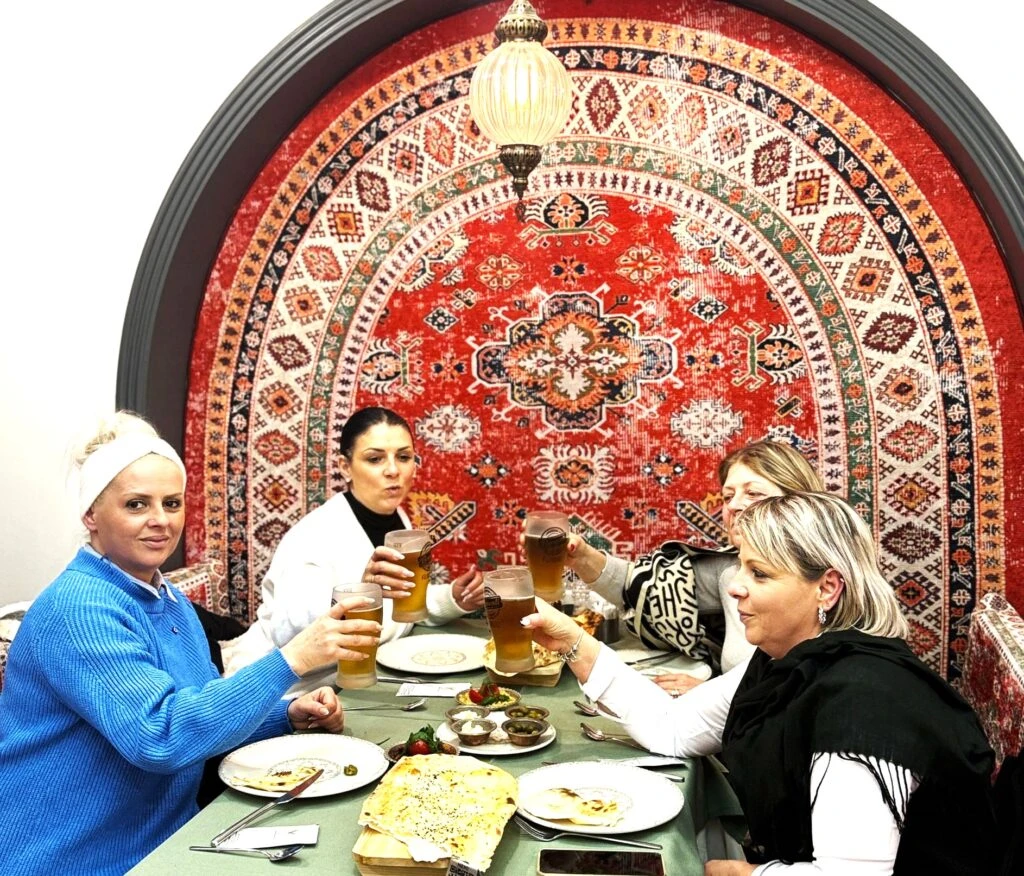
To appreciate why certain establishments shine as the best restaurants in Istanbul, one must delve into the broader spectrum of Turkish cuisine. Turkish food extends far beyond the boundaries of Istanbul, offering a culinary panorama shaped by diverse geographical regions—from the Black Sea’s hearty seafood dishes to the Southeast’s spicy kebabs and mezes. Because Istanbul is the country’s cultural nexus, its restaurants often serve as a stage where the full range of Turkish gastronomy comes together, presenting flavors from every corner of Turkey.
Turkish cuisine’s foundation lies in its ingenious use of fresh, locally sourced ingredients. Vegetables, legumes, grains, and meats are carefully integrated into recipes that emphasize balance and flavor harmony. Olive oil-based vegetable dishes (zeytinyağlı) are a testament to the Mediterranean influence, while slow-cooked stews with succulent chunks of meat represent the hearty Anatolian tradition. Many of the best restaurants in Istanbul are meticulous about ingredient quality, sourcing from small farms or local markets to maintain authenticity and flavor integrity.
Herbs and spices play a decisive role in Turkish cooking. Parsley, dill, mint, cumin, paprika, and sumac are frequent stars, each contributing subtle nuances that elevate a dish from simple to memorable. Spices like cinnamon or allspice, occasionally used in meat dishes, hint at Ottoman-era culinary practices. These spice blends create depth, ensuring that each meal is not just about sustenance but also about experiencing layers of aromatic complexity. Some restaurants may incorporate modern techniques or global cuisines, yet the finest among them manage to preserve this core essence that makes Turkish food unique.
Bread is another cornerstone of Turkish cuisine, coming in numerous forms. From the pillowy bazlama to the crispy pide, bread accompanies almost every meal. Pide, sometimes referred to as Turkish pizza, is a boat-shaped flatbread topped with cheese, meat, or vegetables. Simit, the ring-shaped sesame bread sold by street vendors, is quintessentially Turkish. Many of the best restaurants in Istanbul take bread-making seriously, offering fresh, handmade loaves baked in traditional stone ovens. The aroma alone can draw people from across the street.
Meat lovers find their haven in Turkish cuisine, which boasts a variety of kebabs, ranging from shish kebab (marinated cubes of meat grilled on skewers) to Adana kebab (spicy ground meat shaped around a skewer). Lamb is particularly prized in Turkish kitchens, and Istanbul’s top grill houses excel at cooking it to succulent perfection. In the southeastern regions, dishes like çiğ köfte (spicy raw meatball, though modern versions are often meat-free) originated and have made their way to Istanbul’s dining tables, reflecting the city’s role as a national culinary melting pot.
While Istanbul’s coastal position offers abundant seafood options, the entire country’s seas, rivers, and lakes also contribute to the fish selection. Sea bream, sea bass, bluefish, and anchovies from the Black Sea often grace the menus of fish restaurants. Prepared in different ways—grilled, fried, or baked in clay pots—fish dishes provide a lighter counterpoint to the heavier meat-based fare. Many of the best restaurants in Istanbul that focus on seafood also prioritize sustainability and seasonal availability, ensuring dishes are both fresh and environmentally responsible.
A highlight of any Turkish meal is meze—small plates served either before the main course or on their own, especially with rakı in a meyhane setting. Mezes vary widely, from cold dips like haydari (yogurt with garlic and herbs) to warm offerings like sigara böreği (fried pastry rolls filled with cheese or meat). These small plates encourage communal dining, allowing everyone at the table to sample a variety of flavors. This culture of sharing is central to Turkish cuisine and amplifies the convivial atmosphere found in many of the best restaurants in Istanbul. Here, conversation and laughter flow as freely as the dishes, making the dining experience feel celebratory.
No exploration of Turkish cuisine would be complete without mentioning the sweet tooth that characterizes many traditions here. Dessert in Turkey is an art form, combining sugary syrups with nuts, dough, or dairy in countless creative ways. The famed baklava stands out, but there are also lesser-known specialties like şöbiyet (a baklava variant stuffed with sweet cream) and güllaç (layers of starch wafers soaked in sweetened milk, typically enjoyed during Ramadan). These confections symbolize the opulent legacy of Ottoman desserts, where bakers used to compete in the palace kitchens to create the most exquisite sweet treats. Modern dessert shops continue to innovate, offering new twists on classic recipes, yet they never lose sight of the tradition that gives these sweets their timeless appeal.
Understanding Turkish cuisine is a journey into the soul of a nation that values hospitality, community, and flavor above all else. This perspective enables travelers and locals alike to better gauge why certain establishments rank among the best restaurants in Istanbul. It is not simply about taste; it is also about preserving heritage, fostering social connections, and ensuring a level of quality that leaves diners with both a satisfied palate and a deeper appreciation for Turkish culture. So, as you explore Istanbul’s myriad culinary offerings, remember that each dish is a testament to centuries of regional influences woven together by a shared love for good food.
Food Palace 1981 – An Iconic Destination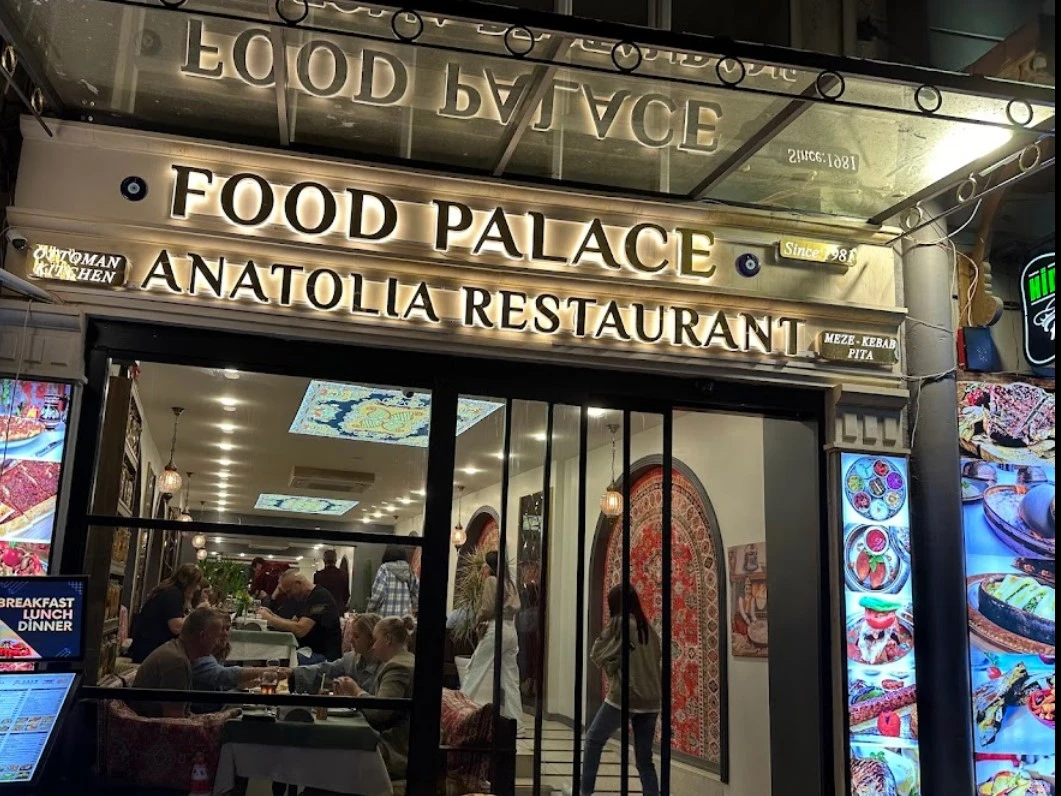
In a city celebrated for its culinary abundance, it takes more than just good food to stand out among the best restaurants in Istanbul. Food Palace 1981 has accomplished precisely that, carving out a reputation that merges historical reverence with modern panache. Situated in a dynamic part of Istanbul, it has become a beacon for both locals and tourists eager to immerse themselves in the city’s gastronomic traditions while enjoying an elevated dining experience.
From the moment you step into Food Palace 1981, the ambiance wraps you in the essence of Istanbul. The interior design marries timeless Turkish motifs with contemporary aesthetics, offering an inviting yet sophisticated atmosphere. Antique elements reminiscent of Ottoman splendor—such as ornate lamps or carefully chosen artwork—adorn the space, echoing Istanbul’s layered history. Yet, the layout remains sleek and welcoming, reflecting the modern sensibilities that today’s diners expect from the best restaurants in Istanbul.
The menu at Food Palace 1981 pays homage to local cuisine, featuring an array of Turkish classics executed with refined expertise. You might start with a selection of cold mezes—creamy hummus, baba ganoush infused with a smoky hint of roasted eggplants, and tangy feta drizzled with olive oil. Warm meze options could include crispy calamari or freshly baked flatbreads topped with aromatic spices. The variety underscores Istanbul’s rich tapestry of flavors, a culinary style that prizes both communal enjoyment and individual taste preferences.
Moving on to main courses, Food Palace 1981 offers everything from succulent lamb kebabs to meticulously spiced Anatolian stews. Freshness is paramount—meats are sourced from reputable local butchers, and vegetables arrive daily from nearby markets. This commitment to quality is one of the key reasons Food Palace 1981 has earned a place among the best restaurants in Istanbul. Chefs take pride in using traditional cooking techniques, such as slow braising or open-flame grilling, ensuring that each dish bursts with bold, authentic flavors.
Fish and seafood enthusiasts will also find a variety of enticing options. The city’s maritime heritage comes to life in plates like grilled sea bream or shrimp casserole. Seasoned with local herbs and olive oil, these dishes capture the essence of the Mediterranean’s sun-kissed coastline. Savvy diners often pair these maritime delights with a crisp white wine or traditional rakı, enhancing the dining experience and paying tribute to Istanbul’s dining culture that seamlessly integrates land and sea.
Dessert at Food Palace 1981 is treated with the reverence it deserves. You can indulge in traditional sweets like baklava, crafted with painstaking attention to detail—paper-thin layers of phyllo dough enveloping a lavish filling of finely chopped pistachios, drenched in a light syrup that isn’t overpoweringly sweet. Alternatively, you might try a house specialty, perhaps a modern take on kazandibi (caramelized pudding) that melds classic flavors with contemporary plating techniques. Finishing a meal with Turkish tea or coffee is almost mandatory, tying up the culinary journey in a neat bow.
Yet, the dining experience at Food Palace 1981 transcends what appears on the plate. The service team embodies Istanbul’s spirit of hospitality—warm, welcoming, and attentive without being intrusive. Servers are well-versed in the details of each dish, eager to guide newcomers through the menu or recommend pairings that align with personal preferences. This level of care and personal touch underscores the restaurant’s commitment to ensuring that each guest feels genuinely valued, a hallmark of the best restaurants in Istanbul.
Cultural sensitivity also plays a role in Food Palace 1981’s appeal. Understanding that many guests are visiting Istanbul to experience its history, the restaurant often showcases traditional music or décor elements that tell stories of the city’s past. Special themed events might highlight regional cuisines from across Turkey or commemorate historical festivals, providing guests a chance to delve deeper into the cultural fabric of the country. This educational aspect, when combined with delightful food, enriches the overall experience.
Moreover, Food Palace 1981 encourages visitors to explore beyond its doors, recognizing that no gastronomic journey in Istanbul is complete without discovering the nearby landmarks, markets, and local experiences. Situated within accessible distance from historic sites like Hagia Sophia and the Blue Mosque, the restaurant is a convenient stop for tourists looking to replenish their energy after immersing themselves in the city’s cultural wonders. After a day spent wandering Istanbul’s maze-like streets, guests often remark that finishing their itinerary at Food Palace 1981 adds the final flourish to an already unforgettable day.
In a city brimming with dining options, Food Palace 1981 distinguishes itself through a harmonious blend of tradition, innovation, and heartfelt hospitality. It encapsulates the reasons why people travel from afar to sample the best restaurants in Istanbul: the allure of a rich culinary heritage, the comfort of time-honored dishes, and the excitement of contemporary gastronomic creativity. Whether you are a first-time traveler or a seasoned local, a meal at Food Palace 1981 stands as a poignant reminder of Istanbul’s enduring ability to captivate, nourish, and unite people through the universal language of good food.
A Tourist’s Guide to Choosing the Perfect Restaurant
Istanbul can feel overwhelming to newcomers, with its labyrinth of streets and seemingly endless dining venues. For those looking to pinpoint the best restaurants in Istanbul, a bit of strategy can make the experience far more rewarding. While personal taste undoubtedly plays a role, some general criteria can help you navigate the city’s culinary landscape and land a memorable dining experience. Below is a comprehensive guide to choosing the perfect restaurant in Istanbul, ensuring that every bite resonates with the city’s vibrant spirit.
1. Seek Authenticity
Authenticity should be your first consideration. Istanbul’s culinary identity is rich, and the restaurants that honor this heritage are typically the ones that earn the highest acclaim. Look for menus that feature classic Turkish dishes—mezes, kebabs, döner, and seafood options. While fusion cuisine is on the rise, restaurants that faithfully represent local traditions often leave the most enduring impression. Many of the best restaurants in Istanbul seamlessly fuse classic recipes with modern techniques, so keep an eye out for venues that prioritize fresh, local ingredients and time-honored cooking methods.
2. Check Reviews Strategically
Online reviews can be a lifeline in a city as massive as Istanbul. However, not all reviews carry the same weight. Focus on detailed comments that describe specific dishes, ambiance, and level of service. Scan for consistency—if dozens of reviewers praise a restaurant’s Adana kebab or mention the warmth of the staff, there’s a strong likelihood those aspects will hold true. In contrast, a handful of vague, overly positive or negative reviews without substance might be misleading. The best restaurants in Istanbul often have a balanced mixture of local and tourist reviews, reflecting broad appeal and consistent quality.
3. Gauge the Ambiance
Eating out in Istanbul is about more than just the food; it’s about soaking in the city’s energy and convivial spirit. The ambiance of a restaurant can significantly influence how you experience your meal. Are you seeking a casual spot where you can sip tea and chat with locals, or are you celebrating a special occasion that calls for an upscale setting? The best restaurants in Istanbul range from modest family-owned establishments with home-cooked dishes to glamorous rooftop locales boasting sweeping Bosphorus views. Decide what aligns with your preferences and be sure to read or inquire about the restaurant’s vibe before committing.
4. Prioritize Hygiene and Quality
In a city that serves millions of visitors annually, food safety should never be overlooked. Reputable establishments generally pass hygiene inspections and maintain their premises in immaculate condition. A quick observation of the restaurant’s cleanliness—floors, restrooms, and table settings—can offer insight into their overall standards. The best part is that many of the best restaurants in Istanbul take great pride in upholding impeccable hygiene, ensuring that your dining experience is not just delicious but also safe.
5. Consider Location
Location is another vital factor. Istanbul’s sprawling nature means that your proximity to a good restaurant might vary greatly depending on your plans for the day. If you’re visiting historical landmarks like Hagia Sophia or the Blue Mosque, choosing a nearby eatery can be convenient. Notably, restaurants like Food Palace 1981 are strategically situated, enabling tourists to enjoy a grand meal without straying too far from their sightseeing route. However, venturing into residential neighborhoods can also lead to hidden gems, offering a glimpse of authentic local dining culture far from the tourist crowds.
6. Assess Menu Variety and Dietary Options
Turkish cuisine offers a vast array of dishes suitable for different dietary preferences, from vegetarian mezes to grilled meat and fish options. That said, if you have specific dietary needs—like gluten-free or vegan—it’s prudent to verify that the restaurant can accommodate you. Many of the best restaurants in Istanbul are accustomed to international tourists and offer diverse menus. Don’t hesitate to call ahead or check online to see if they have a section dedicated to special diets, as this can save you from disappointment upon arrival.
7. Engage in Word of Mouth
While technology is a powerful ally, sometimes the most authentic recommendations come from locals or fellow travelers you encounter along your journey. Istanbulites are generally proud of their city and more than willing to share their favorite dining spots. Talking to your hotel concierge, local shopkeepers, or taxi drivers can yield invaluable leads. Often, they will point you toward places that are less tourist-centric, offering a more intimate look into local life and gastronomic treasures.
8. Observe Popular Dining Times
Turks love to dine later in the evening, and peak hours usually range from 7 pm to 10 pm. If you arrive too early, the restaurant might be empty, making it challenging to gauge its ambiance. Arrive too late, and you risk a long wait. Since the best restaurants in Istanbul can get crowded, especially on weekends, making a reservation is a smart move if you have your heart set on a specific place. This is doubly important during high tourist season, when Istanbul’s population swells, and seats at top dining establishments become a hot commodity.
9. Explore Neighborhood Specialties
Istanbul’s neighborhoods each have their own character and culinary highlights. For instance, the Kumkapı district is renowned for its fish restaurants, while Beyoğlu is known for its eclectic mix of contemporary and traditional eateries. Nişantaşı offers upscale dining options, and Kadıköy on the Asian side beckons with its bustling market and vibrant café scene. By researching the local specialties of each neighborhood, you’ll not only find the best restaurants in Istanbul but also deepen your understanding of the city’s cultural and culinary variety.
10. Balance Cost and Experience
Finally, consider your budget and what you expect in return. Istanbul caters to all economic levels—there are incredibly affordable eateries dishing out mouthwatering street food and mezes, as well as high-end restaurants offering luxury experiences with premium ingredients. Neither end of the spectrum is inherently superior, and many mid-range spots provide exceptional quality at a fair price. It’s all about balancing your culinary goals with the funds you’re willing to allocate. Food Palace 1981, for instance, offers a refined experience without losing sight of affordability, fitting comfortably among the best restaurants in Istanbul for a broad audience.
By bearing these guidelines in mind, tourists can significantly enhance their chances of uncovering Istanbul’s finest dining experiences. Whether you prioritize authenticity, ambiance, or convenience, a bit of forethought goes a long way. Remember that discovering the best restaurants in Istanbul is not purely a question of following reviews or trends—it also entails engaging with the city’s pulse, listening to local insights, and being open to spontaneous culinary adventures. Ultimately, your restaurant choice in Istanbul should echo the city’s lively soul, providing not just a meal but an unforgettable immersion into Turkish culture and hospitality.

